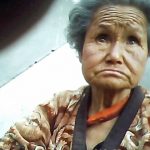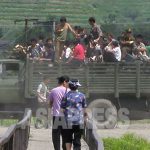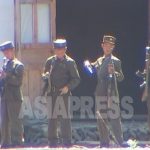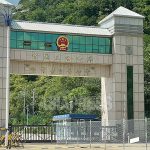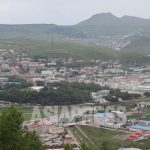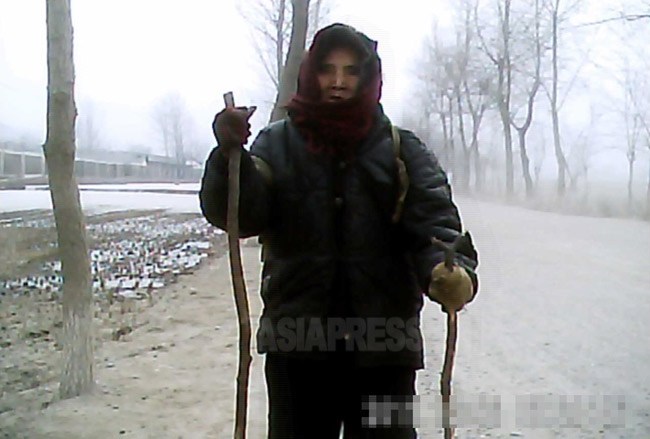
The number of wandering homeless people, or kkotjebi, in North Korea’s urban areas is increasing. These homeless people include those who have lost their homes, children who have been abandoned by their parents, elderly people who have been abandoned by their grown-up children, and others who have abandoned their lives in the cities. The increase in kkotjebi has led the North Korean authorities to conduct a thorough investigation into the conditions faced by the people; however, the impact of this response is low because poverty is the root cause of the rise in homeless people. (KANG Ji-won/ISHIMARU Jiro)
◆ An internal document from 2020 mentions the “increase in wandering people”
ASIAPRESS acquired an internal Workers’ Party of Korea document published in August 2020. The document was entitled “The Recent Increase in Wandering People.” The document was written by the WPK’s Organization Department, and its subtitle read: “Approved by Dear Supreme Leader Comrade Kim Jong-un on September 4, 2020.”
In short, the Organization Department proposed and then received approval regarding the content of the document from Kim Jong-un before handing it down to government agencies nationwide, including the police. The document instructed that officials respond in the following ways to combat the increase in wandering people:
“People’s committees (local governments)and safety agencies (police and other security agencies) shall find all wandering people in their regions and send them to relief sites for settlement; intensify education activities and legal controls to ensure (the increase in wandering people) does not negatively impact emergency quarantine activities; and severely punish through legal means those who have committed grave infractions.”
The COVID-19 pandemic began in January of the year that this document was published. The Kim Jong-un regime locked down the country’s borders with China and enacted tight restrictions on the entry of people and goods, even implementing severe restrictions on private economic activities and movement. These restrictions led to a fall in cash incomes among the country’s urban dwellers. People fell into poverty after using up all their savings and were forced to sell their household items and even their homes to survive.
The document acknowledged that three years ago there was an increase in the number of wandering people in the country due to the worsening economy. Through a recent investigation into conditions in the country, ASIAPRESS has found that the number of kkotjebi has increased even more throughout North Korea. What this means is that North Koreans continue to fall into economic ruin.
The following is the results of the investigation, which was conducted from March through April in four cities in North Korea’s northern region.
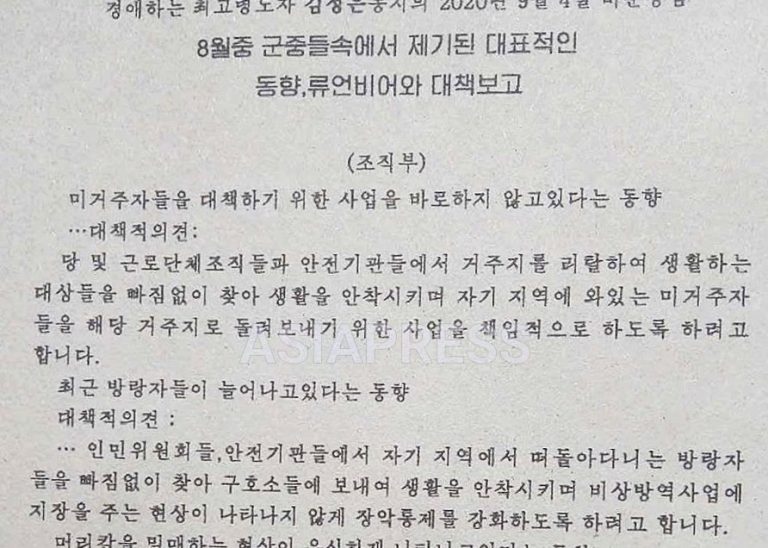
◆ Facing poverty, parents abandon their children
〇A report from Hyesan, Yanggang Province
Recently, I’ve noticed a rise in the number of kkotjebi, who are made up almost exclusively of elderly people and children. They are begging at the entrances to markets.
Many households facing difficult economic circumstances have trouble feeding their elderly relatives. As a result, the heads of neighborhood watch units (inminban) go from house to house to make sure that households are not chasing away their elderly relatives or abusing them.
Family problems, such as divorce, sometimes lead to the abandonment of elderly relatives and children. Police officers conduct investigations into the circumstances of such families through neighborhood watch units. Households facing severe economic difficulties sometimes send their children to the homes of relatives in farming areas, and the police check to make sure that the families really did send the children to relatives instead of just abandoning them.
In Hyesan’s Wuiyeon-dong, a couple facing difficulties left their house in March, leaving an elderly relative who was more than 70 years old at home. Two days later, the elderly man was found dead. I heard the couple was sent to a labor brigade. Parents who abandon their children are also sent to labor brigades.
Because so many people are abandoning elderly parents and children, the police have visited neighborhood watch unit meetings to hold lectures. They warn that “abusing or abandoning one’s parents is considered ‘non-socialist behavior’ and that anyone not sending their children to school and having them work for money instead, or abandoning them, will face severe legal punishment.” Teachers are being told to carefully manage students who are absent from school.
※ Neighborhood watch units are North Korea’s lowest administrative units and are typically made up of 20-30 households. The units take orders from local district offices and report on what people are doing and thinking to the authorities.
※ Labor brigades are “short-term forced labor camps” where people who have disrupted social order or have committed light crimes are sent to without trial proceedings for up to a year. Police departments manage these camps.
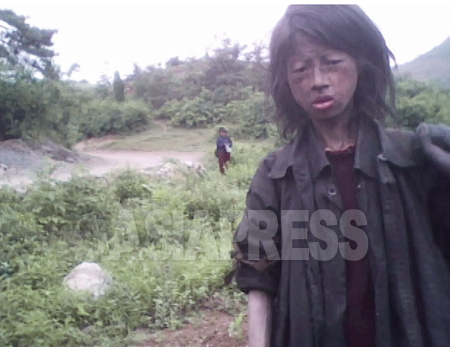
◆ The authorities simply hand down instructions
There is a family of three living in the storage room of my apartment. The family sold their home and rented out the storage space from another person. A person from a Hyesan party organization came and told the family to go back home because it is illegal to buy and sell homes. The family that bought the storage space was upset because they claimed they had no place to go.
※ North Korean apartments have small storage spaces attached to them.
In January of this year, the Hyesan people’s committee ordered that city authorities investigate all cases in which homeless people are living in another person’s storage space or in public places and put together measures to resolve the issue. Anyone wandering around, living in storage spaces or mud huts are being targeted in the crackdown. The order came directly from the Workers’ Party, so government cadres are busily going around to investigate; however, I wonder how they will resolve people’s dire economic circumstances. It doesn’t appear the authorities have measures to resolve the issue.
◆ Kkotjebi freeze or starve to death
〇 A report from Musan County, North Hamgyung Province
When North Korea was hit by a severe cold snap in January, the corpses of people who had froze to death could be found everywhere. Kkotjebi slept in nothing more than windbreak shelters in the cold, or in cornfields, but these places were where they froze to death.
There was such an increase in the number of poverty-stricken people in the downtown part of the county that kkotjebi could be seen at markets. Kkotjebi even sat in front of the apartment I live in. There were people who died of starvation, most of whom were young children, the elderly, or the sick who had no one to look after them.
〇A report from Hoeryong, North Hamgyung Province
There has been a lot of kkotjebi out and about with the coming of the spring weather. There are also children who have died. The other day, I discovered a young girl dead under a bridge in a nearby village. The girl was wearing tattered clothes, so it was hard to know what I was looking at, but there was a smell, so I went over and discovered her dead body. By chance, I passed by a place that handles dead bodies and saw that the bodies were buried in shallow graves near the river.
Recently, even young people don’t have any money, so they are becoming kkotjebi. Government officials have no choice but to detain such people, even if they are looking for food. People sent back to their original areas of residence don’t get any support and have no home to go back to. That’s why they wander around again. There’s a lot of people who are afraid of them because, as adults, they may commit robberies or physically hurt others.
There’s a lot of people who die due to trivial diseases caused by the lack of food. A man in his 40s in one part of town suffered a disease alone after his wife left and died the day before April 15. He was buried without even a funeral. In all of April so far, there have been four people around me who have died of malnutrition.
〇 A report from Sinuiju, North Pyongan Province
I’ve seen kkotjebi here and there. Children are sent to relief centers or orphanages, but they escape almost immediately because of the lack of food in these facilities. They beg for food on the streets, but now almost nobody gives them food because everyone is facing such difficulties. Recently, I’ve heard many stories of kids dying in construction sites or on the streets.
※ ASIAPRESS communicates with reporting partners through Chinese cell phones smuggled into North Korea.
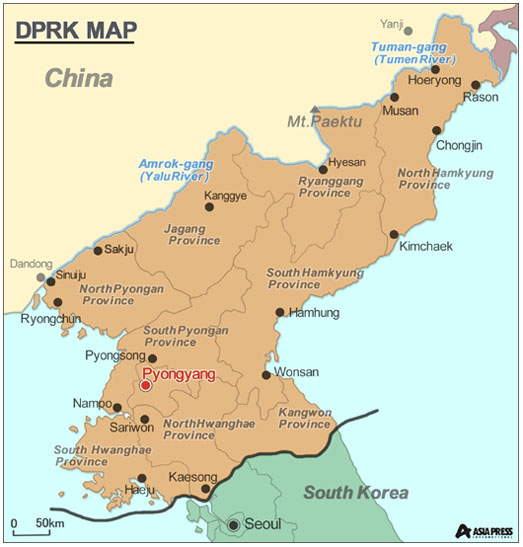
- <Interview with N. Korean> Farm mobilizations start early this year amid orders to mobilize “every able-bodied person,” How about the situation on the ground
- <Inside N. Korea>The authorities strengthen punishments toward those engaging in the “non-socialist” practice of living together outside of marriage, even dragging violators in front of public trials and punishing them with forced labor
- <Inside N. Korea> “Just one piece of laundry soap and a couple kilograms of corn…” ASIAPRESS asks N. Koreans about the special rations for Kim Il Sung’s birthday
- <Interview with N. Korean> Conducts mass mobilization to farming communities: “People are being ordered to increase grain production to the death”… Even farmers are suffering from lack of food
- <Investigation> Changes in how young people view military service: “Why do we need to become soldiers if we’re a strong country with nuclear weapons?”
